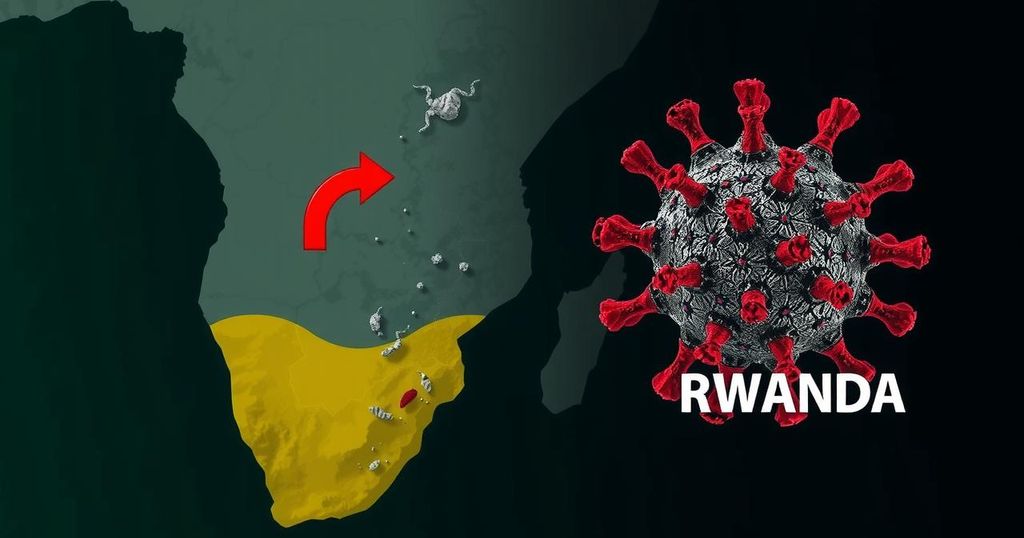Uganda is experiencing a concerning outbreak of mpox with approximately 830 cases reported, particularly affecting adult men. Meanwhile, Rwanda has confirmed four additional cases of Marburg, linked to a fruit bat outbreak, demonstrating the need for urgent vaccination efforts and health responses in the region.
The rising incidence of mpox in Uganda has emerged as a significant health concern, with approximately 830 cases reported across 19 states, as announced by the Africa Centres for Disease Control and Prevention (Africa CDC). The initial case in Uganda was documented within Nakasongola Prison in Central Uganda; however, subsequent cases have surfaced near the border with the Democratic Republic of Congo (DRC). Furthermore, the emergence of “new clusters” within fishing communities necessitates careful monitoring, as conveyed by Dr. Ngashi Ngongo, the mpox lead at Africa CDC, during a recent media briefing. In the last week alone, 61 fresh cases were registered alongside a solitary fatality. In contrast to the DRC, where children constitute approximately half of mpox cases, only 12.5% of Uganda’s cases involve children. A majority of infections, around 63%, are found among adult males, predominantly of the clade 1b strain, which is known for potential sexual transmission. In related developments, Mauritius has confirmed its first mpox case, while the UK registered one case of the clade 1b variant in an individual who had traveled to an affected region. Across the continent, the total count of cases surged by 2,766, echoing previous weeks’ patterns, with the most significant numbers located within the DRC and Burundi. Nearly 900,000 doses of mpox vaccinations have been dispatched to nine nations, with notable progress observed in vaccination campaigns deployed within the DRC and Rwanda. Sadly, Nigeria has delayed its forthcoming vaccination initiative. Simultaneously, Rwanda has reported four additional cases of Marburg in the past fortnight; this includes a healthcare professional along with three other contacts. The confirmed total of Marburg cases in Rwanda stands at 66, accompanied by 15 fatalities, producing a case-fatality rate of approximately 23%. Thus far, nearly 6,000 individuals have undergone testing and around 1,600 frontline health workers have been vaccinated against the virus. The outbreak’s origin has been traced to fruit bats found in a mine located near Kigali, infectious to the primary case who visited that area. The Sabine Vaccine Institute has delivered an extra 1,000 investigational vaccines to Rwanda, paving the way for a randomized clinical trial embedded within an ongoing open-label study. It is important to note that Rwanda previously declined the World Health Organization (WHO) protocol which proposed to include a control group. Instead, Rwanda opted for a comprehensive vaccination approach for all trial participants under a Phase 2 rapid-response open-label trial, supported by the Rwanda Biomedical Centre. The newly structured protocol entails the vaccination of approximately 1,000 individuals at risk, such as mine workers, with Sabin’s single-dose investigational vaccine. Participants will be randomized such that half will receive the vaccine immediately, while the other half will be vaccinated 21 days later, coinciding with the disease’s incubation period. It is crucial to highlight that Sabin’s Marburg vaccine has not yet demonstrated clinical benefits for its recipients.
The public health landscape in Africa is currently challenged by two significant viral outbreaks: mpox and Marburg disease. Mpox, also known as monkeypox, has witnessed a worrying rise in Uganda, prompting health authorities and international organizations to take note. The Africa CDC’s involvement highlights the importance of regional awareness and response capabilities to emerging infectious diseases. Simultaneously, Marburg disease, a lethal virus that can cause severe bleeding and high mortality rates, has similarly emerged in Rwanda, compounding public health concerns in the region. Understanding the epidemiological trends, vaccination efforts, and health policies is crucial in addressing these outbreaks effectively.
In summary, the ongoing mpox outbreak in Uganda is alarming, with a significant number of cases and a noteworthy demographic profile. The emergence of Marburg cases in Rwanda further complicates the public health response in the region. Vaccination efforts and tracking of these diseases remain critical as authorities work to mitigate their spread. Continuous monitoring and global health support are imperative as the situation evolves.
Original Source: healthpolicy-watch.news






